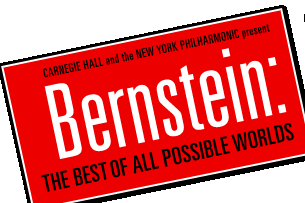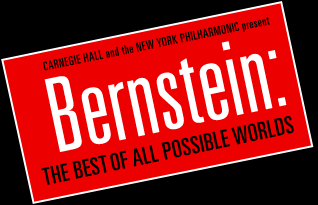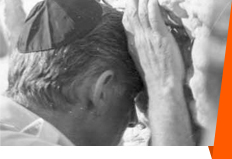
BERNSTEIN AND FAITH
- Leonard Bernstein
- Stage & Film
- Concert Music
- The Conductor
- The Educator
- The Social Activist
- Bernstein’s New York
- Bernstein and Faith
- Bernstein at Carnegie Hall
- Bernstein and the New York Philharmonic
- Bernstein Memory Bank
- Bernstein Timeline
“In the beginning was the note, and the note was with God; and whosoever can reach for that note, reach high, and bring it back to us on earth.”
Video
Jack Gottlieb, Bernstein’s assistant from 1958–1966, discusses how Bernstein’s faith showed up in his compositions and his everyday life.
© 2008 The Carnegie Hall Corporation.
Focus On
Leonard Bernstein: A Jewish Legacy
by Jack Gottlieb
At the 1969 funeral of Leonard Bernstein’s father, which took place at Temple Mishkan Tefila in Chestnut Hill, Massachusetts, Rabbi Israel Kazis eulogized Samuel J. Bernstein as one who was completely involved in worship by always having “his mind in contemplation, his heart in love, his voice in song and his limbs in dance.” Like father, like son. Early on, critics often were distracted by the Maestro’s dance-like style as a conductor. But was this deliberate conduct? He said no; and certainly never for the showoff reasons faultfinders may have ascribed to him. His podium manner had to be a burning need to communicate the composer’s thought processes to both orchestra and audience, whatever the physicality it took to make it manifest.
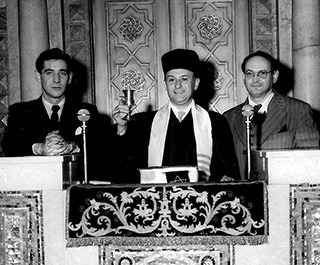
At the world premiere performance of Leonard Bernstein’s Hashkiveinu at the Park Avenue Synagogue, Fri, May 11, 1945. From left: Bernstein, Cantor David Putterman, and Max Helfman, Music Director. Courtesy of the Library of the Jewish Theological Seminary of America, Special Collections
At times it was as if he were, in the title of one of his songs from On the Town, Carried Away. One is reminded of words from Psalm 35: Kol atsmotai tagilna badonai! (All my bones shall exult in the Lord!). This is the article of faith by which Leonard Bernstein lived his life and created his works.
But it is one thing to be carried away as a performer and quite another matter as a composer. A conductor displays his art with a finished product; a composer is concerned with the yet-to-be, the making of that product. There are, of course, musicians like a redhot jazz improviser, or a cantor possessed by spiritual fervor, who can achieve the best of both worlds simultaneously, as creator and recreator. Bernstein worked mightily to realize that paradoxical state of controlled spontaneity above all else in his own compositions.
His earliest memory of music took place about 1926 at Mishkan Tefila (then located in Roxbury, Massachusetts) where, to quote him from an 1989 interview: “I felt something stir within me, as though I were becoming subconsciously aware of music as my raison d’etre.” In fact, his first surviving completed piece was a setting of Psalm 148 which he recalled as having been written between 1932 and 1935, recorded and performed here for the first time. During the following decades he was to write some twenty works on Jewish themes, about one-quarter of his orchestral works, half of his choral compositions, songs and other pieces that have had broad appeal for Jews and Gentiles everywhere.
The greater part of Bernstein’s output was sparked by the interaction of his American conditioning and his Jewish heritage, as in Symphony No.3: Kaddish and Chichester Psalms, both written in Hebrew-Aramaic, but with a touch of his West Side Story sound. Other Jewish works are electric with American kinetic energy even though they are concerned with events that took place “over there.” Among them are Jeremiah, his 1942 symphony written in response to early reports of Nazi anti-Semitism, and Halil, his flute “rhapsody” about young lives laid waste in the Israeli Yom Kippur War of 1973 (a premiere recording here in its chamber version).
More fascinating is how some of the non-Jewish works are flavored with Hebraicisms, including his musical comedy On the Town. Two songs from that show, Ya Got Me and Some Other Time are redolent of a cantorial mode known as Adonai Malakh (The Lord is King). Elsewhere I have shown how other samples are to be found in the Finale of his Symphony No.2: The Age of Anxiety and in Mass, his theater piece based on the Roman Catholic rite, but imbued with hidden Jewish symbolism.
Many people pleaded with Bernstein to write a complete Jewish service. (His setting of the Hashkiveinu prayer was the only attempt.) However, I have come across an undated jotting on a work he was contemplating, but never followed through: “A Cantata on Hebrew-Yiddish Materials That Move Me. What are the Jewish roots I long for? Nostalgia for youth? Guilt towards my father? First real cultural exposure? First real music I heard (Braslavsky)! Seeking a larger identity, with a race or creed?, with a supernatural force? (But the latter word doesn’t account for so many “Yiddish” responses). Seeking any identity? Common roots with siblings? Speaker (English), the singer (Heb. & Yiddish).”
He concluded with titles of prayer, Bible and Haggadah passages: Yigdal, Sholem Aleichem, Judith, Psalms (proud humility), Song of Songs, “And it Came to Pass at Midnight” (Vay’hi b’chatsi halaila) and “It is Enough” (Dayeinu).
Too bad he never wrote this Cantata, but parts of the above list do exist in various works of his.
Bernstein was an unabashed eclectic, an ecumenical lover of the world, and it loved him in return. This, too, was part of his Jewish nature, for Judaism is based on commonality. (Jewish prayer, for example, calls on k’lal Yisrael, all of Israel. There are many fewer Hebrew prayers for the individual.) Bernstein was fiercely loyal to lifelong friendships which always came before his work. On the other hand, he was unhappiest when not working; idleness made him melancholy. Music was his fix, and he experienced it as few of us ever will. It is no accident he identified himself so keenly with the youthful fiddler who drives his listeners to frenzied ecstasy in the Yiddish poem “Oyf mayn khas’eneh” from Arias and Barcarolles (on this recording).
I recall how drained he was after a performance of Tchaikovsky’s Pathétique Symphony in the late 1980s. He said he was “on the brink,” meaning he was transported to a place that had no beginning or end. At such enviable moments, Bernstein was suspended, as in the subtitle of Anski’s classic play The Dybbuk, “Between Two Worlds.” In that timeless void he must have achieved the Hasidic ideal of fusion known as d’veikut, a kind of cosmic glue that leads one towards a sphere where mystical powers dwell, where joy is its own reward. Some of that transcendent uplift can be sensed in the opening of his Dybbuk ballet, here presented for the first time in its version for two pianos and two voices.
Bernstein may not have been traditionally observant, but he was deeply Jewish in every other way. In fact, he once described himself as a “chip,” not off the old block, but “off the old Tanach,” the Hebrew acronym for the complete Bible. As a teenager he even briefly flirted with the idea of becoming a rabbi. As it turned out, he did become a kind of rabbi, albeit one without portfolio; and in fact, Hebrew Union College awarded him an honorary degree. Indeed he was a thoroughly imbued, inbred, and as he labeled his Diaspora Dances from Jubilee Games a “socio-cultural, geo- Judaic” Jew by being:
- a practitioner of tzedaka, a believer in the efficacy of charitable giving;
- a benefactor for a host of students, endowing scholarships, providing instruments, and sponsoring talented youngsters;
- a fierce devotee of book-learning, central to Jewish culture, and a master of word-play, as well;
- a champion of the State of Israel from its inception, as performer and artistic ambassador; a musician-soldier who performed in the field during war-time conditions, under threat of military attack;
- an eloquent sermonizer on nuclear disarmament from synagogue and church pulpits;
- a defender of causes for the oppressed and disenfranchised in his benefit concerts for Amnesty International, and for victims of AIDS in “Music for Life” concerts;
- an inspiring teacher, in the Talmudic style, for a generation of music lovers, many of whom were first introduced to the delights of music by his televised concerts;
- a counselor to the troubled and a source of Solomonic wisdom, which he freely dispensed to anyone in earshot (sometimes, truth to tell, not always welcome); and one of the few celebrated 20th century composers whose catalog consists in large proportion of works on Jewish themes.
No question about it, Leonard Bernstein was one of God’s favorites. When I was a music major in college, I wondered what it would have been like to have known Mendelssohn, Liszt, Mahler and Gershwin. Now I know. Lenny was a bit of all of them and more. He was my mentor and I was privileged to be in his company. May his memory be a blessing for all of us.
Composer Jack Gottlieb recently completed a book Funny, It Doesn’t Sound Jewish: How Yiddish Songs and Synagogue Melodies Influenced Tin Pan Alley, Broadway and Hollywood. A joint publication by The Library of Congress and SUNY Press (Albany), it was released in the spring of 2004. Copyright 1993, 2003 by Jack Gottlieb. May not be reproduced without written permission from the author. All rights reserved
Listen
Excerpt from Bernstein’s Symphony No. 3, “Kaddish” (III.a.“Kaddish 3”)
Israel Philharmonic / Leonard Bernstein, Conductor; Michael Wager, Speaker. Deutsche Grammophon.
Find this and more of Leonard Bernstein’s work at ArkivMusic.com ›
Related Links
The Bernstein Mass Project » Mass » Jubilee Games » Symphony No. 1 “Jeremiah” » Symphony No. 3, “Kaddish” »
Support
Support Festivals at Carnegie Hall
Join Today! ![]()
Leonard Bernstein: American Original
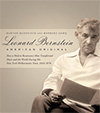
By Burton Bernstein— former New Yorker writer and Leonard’s brother—and the New York Philharmonic’s historian, Barbara Haws.
Buy now ![]()
Related Events
© 2001–2008 Carnegie Hall Corporation
- Home
- |
- Multimedia
- |
- Press
- |
- Partners
- |
- Supporters


